ENERGY MED MARINE COLLAGEN
CYNERGY MED COLLAGEN is an innovative food supplement containing Hydrolyzed collagen peptides from fish (Peptan®), Hyaluronic Acid, Vitamin C and selected B-Vitamins (B1, B3, and B5).
Description
| Active ingredients | Per 30ml |
|---|---|
| Hydrolyzed fish collagen | 10000mg |
| Hyaluronic Acid | 20mg |
| Vitamin C | 80mg |
| Vitamin B1 | 1,1mg |
| Vitamin B3 | 16mg |
| Vitamin B5 | 6mg |
Hyaluronic acid
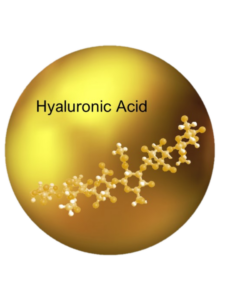
Hyaluronic acid is a substance that is naturally present in the human body. It is found in the highest concentrations in fluids in the eyes and joints.
Hyaluronic acid:
- promotes Healthier, More Supple Skin
- can Speed Wound Healing
- relieve Joint Pain by Keeping Bones Well Lubricated
- soothe Acid Reflux Symptoms
- preserve Bone Strength
Vitamin C helps:
Vitamin C or ascorbic acid is a water-soluble vitamin. That means that it is dissolved in water and readily absorbed into tissues for immediate use. The body doesn’t store it. To maintain adequate levels of vitamin C you need to consume food that contains it every day. Humans cannot synthesize ascorbic acid due to a lack of an enzyme (gluconolactone oxidase). That’s why ascorbic acid must be supplemented through fruits, vegetables, and tablets. Both natural and synthetic ascorbic acid are chemically identical and there are no known differences in their biological activities or bioavailability.
Vitamin C:
- plays a critical role in wound repair and the healing/regeneration process as it stimulates collagen synthesis.
- is essential for the synthesis of muscle carnitine. Carnitine is required for the transport and transfer of fatty acids into mitochondria where it can be used for energy production.
- is necessary for the transformation of cholesterol into bile acids.
- It enhances the availability and absorption of iron from non-heme iron sources
Vitamin B1 contributes:
Thiamine is an essential nutrient that all tissues of the body need to function properly. Thiamine was the first B vitamin that scientists discovered. Therefore, its name carries the number 1. Like the other B vitamins, thiamine is water-soluble and helps the body turn food into energy. You can find it in foods, individual supplements, multivitamins. The body needs thiamine to make adenosine triphosphate (ATP). This is a molecule that transports energy within cells. Vitamin B1, enables the body to use carbohydrates as energy. It is essential for glucose metabolism, and it plays a key role in nerve, muscle, and heart function. It helps prevent complications in the nervous system, brain, muscles, heart, stomach, and intestines. It is also involved in the flow of electrolytes into and out of muscle and nerve cells. A thiamine deficiency can impact many divergent functions of your body, including those of the: nervous system, heart, brain.
Thankfully, thiamine deficiency is uncommon in the developed world. Thiamine deficiency is rare in healthy adults. It’s more common in people with specific medical conditions. Conditions that can impair thiamine levels include alcoholism, Crohn’s disease, anorexia.
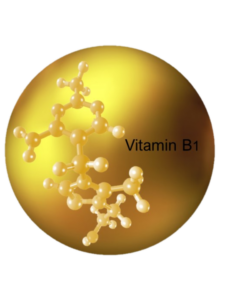
Most people can get all the thiamine they need from food. There are no real risk factors associated with thiamine consumption. You can find thiamine in pork, poultry peas, nuts, dried beans, soybeans, whole-grain cereals, lentils, legumes, bread, rice, yeast. Many whole-grain products are fortified with thiamine, such as cereal, bread, rice, pasta.
Certain foods and dietary practices can cancel out the body’s usage of thiamine and lead to deficiency. These include:
- drinking lots of coffee or tea, even decaffeinated
- chewing tea leaves and betel nuts
- regularly eating raw fish and shellfish
Vitamin B5 helps:
All B vitamins help the body convert food (carbohydrates) into fuel (glucose), which the body uses to produce energy. These B vitamins, often referred to as B complex vitamins, also help the body use fats and protein. B complex vitamins are needed for healthy skin, hair, eyes, and liver. They also help the nervous system function properly. Vitamin B5, or pantothenic acid, is naturally present in foods, added to foods and available as a supplement. It is used to make coenzyme A (CoA), a chemical compound that helps enzymes to build and break down fatty acids as well as perform other metabolic functions, and the acyl carrier protein, which is also involved in building fats. Pantothenic acid is found in a wide variety of foods. Bacteria in the gut can also produce some pantothenic acid but not enough to meet dietary needs.
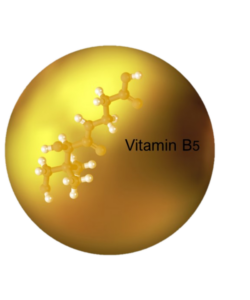
Vitamin B5 has many essential functions. These include:
- converting food into glucose
- synthesizing cholesterol
- forming sex and stress-related hormones
- forming red blood cells
- maintain a healthy digestive system and assist the body in using other vitamins, especially vitamin B2.
Vitamin B3
Niacin, or vitamin B3, is a water-soluble B vitamin found naturally in some foods, added to foods, and sold as a supplement. The two most common forms of niacin in food and supplements are nicotinic acid and nicotinamide. The body can also convert tryptophan—an amino acid—to nicotinamide. Niacin is water-soluble so that excess amounts the body does not need are excreted in the urine. Niacin works in the body as a coenzyme, with more than 400 enzymes dependent on it for various reactions. Niacin helps to convert nutrients into energy, create cholesterol and fats, create, and repair DNA, and exert antioxidant effects.
Niacin helps:
- In normal energy metabolism
- The proper functioning of the nervous system
- In normal psychological function
- maintaining normal mucosal
- maintaining healthy skin
- The reduction of tiredness and fatigue


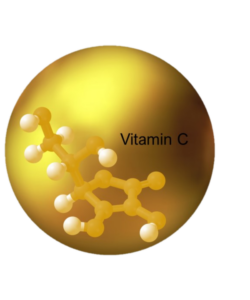
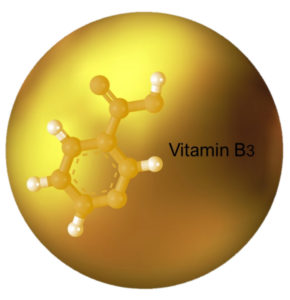
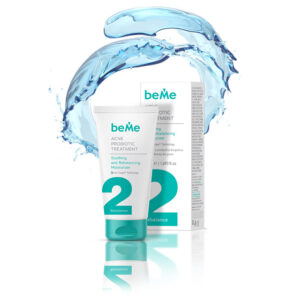


Reviews
There are no reviews yet.